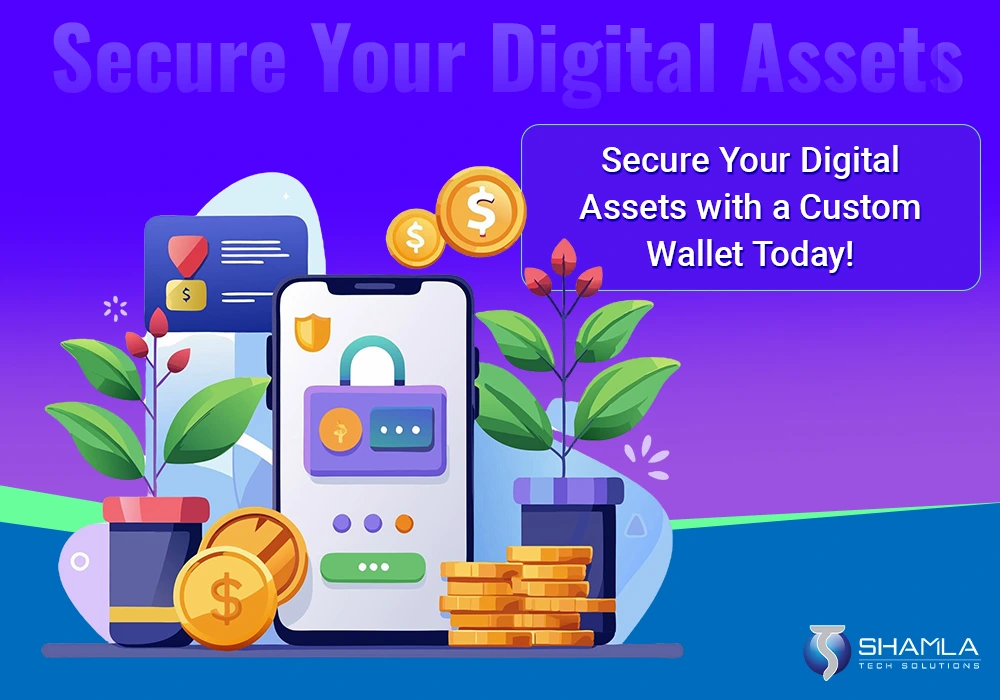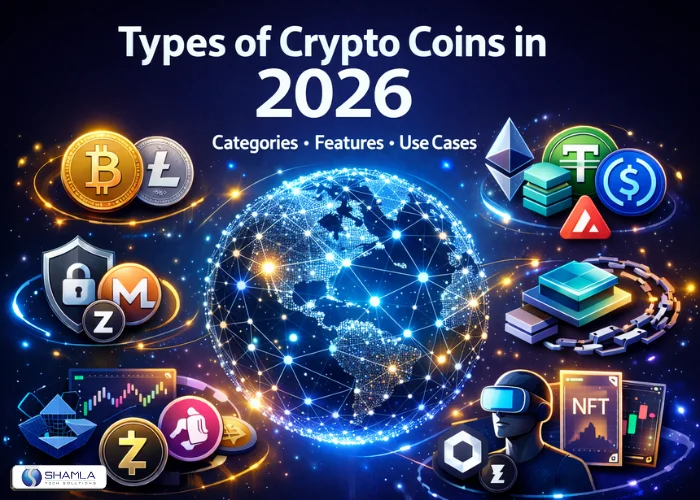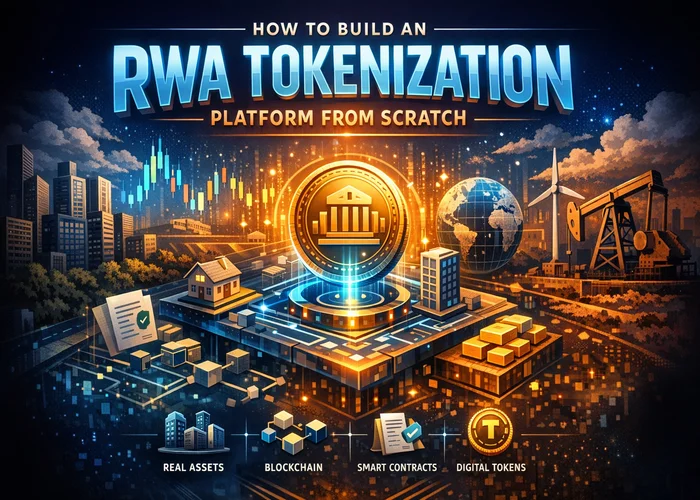In the ever-evolving world of digital finance, creating your own cryptocurrency is an exciting endeavor. Whether you’re looking to start your own blockchain project, build a cryptocurrency coin, or create your token for specific use cases, the process has become much more accessible. This guide will break down how to create your token and walk you through the steps to successfully create a cryptocurrency coin, from concept to launch. By the end of this article, you’ll know exactly how to create your crypto coin and navigate the intricacies of cryptocurrency coin development. In this comprehensive guide, we will discuss the steps required to create a cryptocurrency coin, the role of blockchain, and the potential challenges, along with a deep dive into the process of token development and wallet creation.

How to Create Your Own Token in 5 Minutes?
Creating your own cryptocurrency token is now simpler than ever, and with the right tools and guidance, you can create your token in just 5 minutes! Whether you’re looking to launch a decentralized project or build your own cryptocurrency ecosystem, the process can be broken down into straightforward steps. In this guide, we’ll walk you through exactly how to create your token quickly and efficiently, without requiring extensive technical expertise.
Here’s everything you need to know to start a cryptocurrency coin and build your token in no time!
Step-by-Step Guide: How to Create Your Own Token in 5 Minutes
Step 1: Choose a Blockchain Platform for Cryptocurrency Coin Development
The first step to create your token is selecting the right blockchain platform. When it comes to cryptocurrency coin development, Ethereum (ERC-20) and Binance Smart Chain (BEP-20) are two of the most popular platforms.
- Ethereum (ERC-20): Ethereum is the most widely used blockchain for token creation. Its ecosystem supports a wide range of decentralized applications, which makes it a great choice if you want to build a cryptocurrency coin for DeFi, NFTs, or other blockchain solutions.
- Binance Smart Chain (BEP-20): Binance Smart Chain has gained popularity due to its low fees and fast transaction speeds. If you want to develop a cryptocurrency coin that offers more affordable transaction fees, BSC might be your best option.
Step 2: Set Up Your Digital Wallet
Once you’ve chosen the blockchain on which to create your token, the next step is to set up a digital wallet like MetaMask or Trust Wallet. This wallet will be used to interact with the blockchain and store the tokens you will create.
- Install MetaMask: MetaMask is one of the easiest and most secure wallets for cryptocurrency coin development. Install the MetaMask extension or mobile app and create an account.
- Connect to the Blockchain: Connect MetaMask to the blockchain network you plan to use for your token, whether it’s Ethereum or Binance Smart Chain.
This wallet is crucial for managing your tokens and paying gas fees when you create a cryptocurrency coin.
Step 3: Use a Token Generator Tool to Create Your Own Token
Now, it’s time to actually create your token! Many platforms offer token generator tools that allow you to quickly start a cryptocurrency coin or token without any programming knowledge.
- Select a Token Generator: There are several token creation tools available. For Ethereum-based tokens, you can use services like MyEtherWallet, while Binance Smart Chain has its own tools.
- Customize Your Token: Enter the details for your token, including:
- Token Name: The name you want for your token, which could be anything from “MyCoin” to something more unique.
- Symbol: A three to five-letter identifier for your token, like BTC or ETH.
- Decimals: This determines how divisible your token is (typically set to 18).
- Total Supply: Decide how many tokens you want to create initially.
At this stage, you’ve essentially started the process to create your crypto coin by defining its basic parameters.
Step 4: Deploy the Smart Contract to develop a Cryptocurrency Coin
Once you’ve customized your token, you will need to deploy its smart contract onto the blockchain. This step finalizes the creation of your own token and makes it live on the network.
- Review Contract Details: Before deployment, double-check your token settings.
- Pay the Gas Fees: To finalize the cryptocurrency coin development, you’ll need to pay a transaction fee (gas fee) in cryptocurrencies such as ETH (Ethereum) or BNB (Binance Smart Chain).
- Deploy the Contract: Once the fee is paid, deploy the smart contract, and your token will be live on the blockchain!
In just a few clicks, you’ve successfully started to build a cryptocurrency coin and bring your project to life.
Step 5: Verify and Manage Your Token
Now that you’ve successfully deployed your token, it’s time to verify and manage it. You can use blockchain explorers like Etherscan (for Ethereum) or BscScan (for Binance Smart Chain) to check your token’s details and track transactions.
- Verify on Etherscan/BscScan: Input your token’s smart contract address into the explorer to see your token’s public information.
- Add to Your Wallet: To manage and view your tokens, add them as a custom token to your MetaMask or Trust Wallet.
To support your newly created token, you’ll also need to provide users with a compatible wallet for storing and using your coin. MetaMask is one of the best wallets to use when you create your own crypto coin because it’s easy to integrate with most blockchains.
If you want professional assistance in cryptocurrency coin development, Shamla Tech can help you create your crypto token efficiently. With expertise in blockchain development, we provide customized solutions to develop a cryptocurrency coin with advanced features such as staking, governance models, and smart contract security.
What Do I Need to Build a Cryptocurrency Coin?
Building a cryptocurrency coin requires a combination of technical tools, knowledge, and strategic planning. Whether you’re aiming to create a utility token, start a new blockchain-based project, or launch your own digital currency, here’s a breakdown of what you need to build a cryptocurrency coin from scratch.
Essential Requirements to Create a Cryptocurrency Coin
1. A Blockchain Platform
The most critical component to build a cryptocurrency coin is a reliable blockchain platform. You can either create your own blockchain or use existing ones like Ethereum, Binance Smart Chain, or others. Here are the two primary approaches:
- Create Your Own Blockchain: This method is more complex and requires a deep understanding of blockchain technology. It involves setting up nodes, consensus mechanisms, and infrastructure to support the network.
- Use Existing Blockchain Networks: Many projects opt to create tokens on established blockchains like Ethereum (ERC-20) or Binance Smart Chain (BEP-20). These platforms provide a secure, decentralized environment for cryptocurrency coin development and reduce the complexity of launching your token.
2. Digital Wallet
A cryptocurrency wallet is essential for holding, sending, and receiving your newly created coin. MetaMask, Trust Wallet, and Ledger are popular options for storing and interacting with tokens. You’ll need a wallet to:
- Hold the Coin: After you create your token, you’ll need a wallet to store it.
- Pay Gas Fees: Digital wallets also allow you to pay the gas fees required for deploying smart contracts on the blockchain.
3. Smart Contract Development
If you’re using an existing blockchain platform like Ethereum or Binance Smart Chain, you’ll need to create a smart contract to define the token’s behavior and properties. The smart contract is a self-executing code that governs how the coin operates, including aspects such as:
- Total Supply: How many tokens will be minted.
- Decimals: The divisibility of the token.
- Transfer Rules: Conditions under which the tokens can be transferred.
Tools like Remix, Solidity (for Ethereum), or other blockchain-specific coding environments are used to write and deploy these smart contracts when you create a cryptocurrency coin.
4. Tokenomics Plan
Before you create a cryptocurrency coin, you must define your tokenomics, which involves determining how your cryptocurrency will function within its ecosystem. This includes:
- Total Supply: The maximum number of tokens that will exist.
- Distribution: How the tokens will be distributed (e.g., initial offering, staking rewards, airdrops).
- Utility: What purpose does the token serve? Will it be used for transactions, staking, or governance?
A strong tokenomics plan is key to ensuring your coin has value and demand when you start a cryptocurrency coin.
5. Development Team
If you’re aiming to develop a cryptocurrency coin from scratch or build a unique blockchain, you’ll need a solid team of developers proficient in blockchain technologies, cryptography, and decentralized systems. They will help with:
- Setting up the Blockchain: If you’re not using an existing platform.
- Smart Contract Development: Writing, testing, and deploying your token’s smart contract.
- Security Audits: Ensuring that your code is secure and resistant to attacks.
Even if you’re using token generators to create your token, having access to technical support is essential.
6. Security Measures
Security is crucial when developing cryptocurrencies. You’ll need to ensure that your smart contracts are secure, especially if you’re handling user funds. A third-party security audit is highly recommended for projects aiming for high credibility.
- Penetration Testing: Regular testing of the smart contract and the blockchain.
- Audits: Security audits can help detect vulnerabilities and strengthen your coin’s defenses.
7. Legal Compliance
Ensuring that your cryptocurrency complies with relevant laws and regulations is essential. This will vary depending on your country and the purpose of the coin. Common legal considerations include:
- Regulatory Approvals: In many jurisdictions, you’ll need approval from regulatory authorities, especially if you plan to issue a utility or security token.
- Anti-Money Laundering (AML) and Know Your Customer (KYC): Depending on where you launch your token, these rules may apply to your project.
8. Launch Strategy
Once you’ve created your cryptocurrency coin, you need a strategy to launch and promote it. A successful launch involves:
- Listing on Exchanges: Getting your token listed on cryptocurrency exchanges allows users to trade and buy your coin.
- Marketing and Community Building: Building a community around your cryptocurrency is vital for its adoption. You’ll need a robust marketing plan that includes social media, influencers, and partnerships.
- Initial Coin Offering (ICO): You can raise funds by offering a portion of your tokens to early investors in an ICO or token sale.
9. Blockchain Explorer
A blockchain explorer (e.g., Etherscan for Ethereum) allows users to track their transactions and view details about your coin. You’ll need to register your token’s smart contract on a blockchain explorer so it’s visible and verifiable to the public.
To build a cryptocurrency coin, you need the right tools, technical knowledge, and a clear plan. By following the steps outlined above, you can either create your token on an existing blockchain like Ethereum or Binance Smart Chain or go all-in and develop your own custom blockchain for full control.
Whether you’re looking to create a cryptocurrency coin for your project, launch a new financial system, or simply experiment with blockchain technology, understanding the essential requirements will guide you to successful cryptocurrency coin development.

How Difficult Is It To Create Your Own Crypto Token?
Creating your own crypto token or currency can range from relatively easy to highly complex, depending on several factors. These include your goals, the blockchain platform you choose, the level of customization you need, and your technical expertise. Here’s a breakdown of the difficulties involved in creating your own crypto token.
Difficulty Levels of Creating Your Own Token
1. Using a Token Generator (Low Difficulty)
For those looking to create your token quickly without diving deep into technical coding, token generators on established blockchains like Ethereum, Binance Smart Chain, and Polygon offer a simplified solution. These platforms allow you to create a token in just a few minutes with minimal coding required.
- Process: You’ll only need to fill out basic token details, such as the token name, symbol, total supply, and decimals. The platform will generate the smart contract for you.
- Challenges: While easy, token generators offer limited customization options. You may not be able to tweak specific functionalities like token burning, minting, or advanced governance.
- Skills Required: No deep technical knowledge is required, but understanding blockchain fundamentals and how smart contracts operate is helpful.
2. Using a Pre-existing Blockchain (Moderate Difficulty)
Another way to create your crypto coin is by utilizing established blockchain platforms such as Ethereum (ERC-20 tokens), Binance Smart Chain (BEP-20 tokens), or Solana. This requires deploying a smart contract that governs your token’s behavior. Many developers choose this path because it balances flexibility and simplicity.
- Process: You will need to code the smart contract or use templates to define parameters like the total supply, token transfers, minting, and burning functions.
- Challenges: Writing a smart contract and deploying it requires a solid understanding of blockchain programming languages like Solidity (for Ethereum) or Rust (for Solana).
- Skills Required: Intermediate programming skills and a strong understanding of blockchain and smart contract development are necessary. Additionally, testing the smart contract for security vulnerabilities is crucial.
3. Creating Your Own Blockchain (High Difficulty)
To fully create your own cryptocurrency coin and not just a token, you can build a custom blockchain from scratch. This is the most complex option but offers the greatest level of control and flexibility over your cryptocurrency. Coins like Bitcoin and Ethereum have their own blockchain networks, and if you want to follow their path, it involves significant technical and financial resources.
- Process: Building a blockchain requires developing the underlying architecture, creating consensus mechanisms, setting up nodes, and ensuring network security.
- Challenges: You’ll face complex challenges such as scalability, security, transaction validation, and ensuring your network is resistant to attacks.
- Skills Required: Advanced programming skills in languages like C++, Python, or Java are required. You also need expertise in cryptography, blockchain protocols, and distributed ledger technology.

Factors That Impact the Difficulty of Token Creation
1. Customization Needs
The more features you want to implement—such as token governance, staking, or a dual-token system—the more complex it becomes to start a cryptocurrency coin. A simple utility token is easier to create than a token that integrates with decentralized finance (DeFi) or supports advanced smart contract features.
2. Security
When you develop a cryptocurrency coin, security is a paramount concern. Auditing your smart contracts to ensure they are free from vulnerabilities can add to the complexity of the process. If you’re creating your own blockchain, you must also manage the security of the entire network.
3. Legal and Regulatory Compliance
Ensuring your token complies with regulations can make the process more challenging. Different countries have varying regulations on crypto projects, and it’s important to understand whether your token will be classified as a security, utility token, or currency. Complying with Anti-Money Laundering (AML) and Know Your Customer (KYC) regulations may also complicate the process.
4. Launch Strategy
Launching and maintaining your token is another challenging aspect. You’ll need to market your token, ensure its adoption, get it listed on exchanges, and potentially build a community around it. This process can take time and requires a strategic approach to be successful.
Common Challenges in Cryptocurrency Coin Development
Gas Fees: High transaction fees on popular blockchains like Ethereum can make deploying smart contracts expensive.
Network Congestion: If the blockchain network you choose is heavily congested, token transfers can be slow and costly.
Testing and Auditing: Testing your token on testnets and performing security audits are crucial steps to avoid vulnerabilities. This requires time and expertise.
Is it Difficult to Create Your Own Token?
The difficulty of creating your own token depends on how much control you want and the level of customization you need. If you’re looking for a simple token with basic functionalities, using token generators or established blockchains can make the process quick and straightforward. However, if you’re aiming to create your token from the ground up, complete with its own blockchain and network, the process becomes more technically challenging and resource-intensive.
Whether you’re creating a simple token for a project or a full-fledged cryptocurrency coin like Bitcoin, understanding the level of difficulty ahead of time helps you prepare accordingly. If you’re looking for a fast and simple way to start a cryptocurrency coin, using existing platforms is the easiest path. However, for those aiming to build something ground-breaking, investing in a dedicated development team and the necessary infrastructure is essential.
Can I Launch My Own Crypto Coin Like Bitcoin?
Yes, you can launch your own crypto coin like Bitcoin, but it requires significant technical expertise, planning, and resources. At Shamla Tech, we specialize in helping you create your token or cryptocurrency coin with the full support of our expert team.
To develop a coin similar to Bitcoin, you’ll need to build a blockchain from scratch or modify an existing one. This involves selecting a consensus mechanism, like Bitcoin’s Proof-of-Work or alternatives like Proof-of-Stake, and designing essential aspects such as block time, rewards for miners or validators, and the coin’s economic model. Our team at Shamla Tech provides customized solutions for each of these technical steps, ensuring your coin is secure, scalable, and efficient.
We also assist with the complex aspects of cryptocurrency coin development, including designing and deploying smart contracts, developing wallet solutions, and securing your blockchain to prevent threats like 51% attacks. Additionally, regulatory compliance is a crucial factor, and we ensure your coin adheres to the legal standards in your jurisdiction.
From whitepaper creation to mainnet launch, we offer end-to-end services to guide you through every stage of launching your own crypto coin. With Shamla Tech’s expertise, you can bring your vision to life and build a trusted, decentralized cryptocurrency like Bitcoin while focusing on unique features that set your project apart. Together, we can help you start a cryptocurrency coin successfully, positioning you for growth and long-term success in the competitive crypto landscape.

How Do I Create My Own Wallet For A New Crypto Coin?
Creating your own wallet for a new crypto coin is a critical step in the cryptocurrency coin development process. A crypto wallet allows users to store, send, and receive your new coin securely. Here’s a step-by-step guide on how to create your own wallet for a new crypto coin:
1. Choose the Type of Wallet
There are different types of wallets, each offering varying levels of security and accessibility:
- Hot Wallets: Connected to the internet, such as mobile or web wallets, offering convenience for regular transactions.
- Cold Wallets: Offline storage methods like hardware wallets (e.g., Ledger, Trezor) that provide enhanced security.
- Desktop Wallets: Software installed on your computer, offering a balance between security and convenience.
Decide which type suits your needs depending on whether the focus is security, convenience, or both.
2. Select a Blockchain Platform
If you plan to create your token on an existing blockchain like Ethereum, Binance Smart Chain, or Solana, you can leverage their existing wallet infrastructure (e.g., MetaMask for Ethereum-based tokens). However, if you’re building your own blockchain, you’ll need to develop a custom wallet from scratch.
3. Develop the Wallet Application
Developing a wallet for your new crypto coin involves coding the front-end interface and back-end functions. Here are some key components:
- User Interface (UI): Design an intuitive, user-friendly interface for users to manage their funds, view transactions, and interact with your coin.
- Private Key Management: The wallet must generate, store, and manage private and public keys securely. This ensures that users retain full control over their coins.
- Transaction Functionality: Implement features that allow users to send and receive your coin securely and efficiently.
- Integration with Blockchain: Connect your wallet to your blockchain or token platform so it can read balances, validate transactions, and interact with smart contracts.
Programming languages like Python, JavaScript, and C++ are commonly used for wallet development, along with libraries such as Web3.js (for Ethereum) or Bitcore (for Bitcoin-like blockchains).
4. Ensure Security Features
Security is paramount in wallet development. Incorporate key security features like:
- Encryption: Encrypt private keys and sensitive user data to prevent hacking attempts.
- Two-Factor Authentication (2FA): Adding layers of security for users during transactions.
- Backup and Recovery: Implement a secure seed phrase generation system to allow users to recover their wallets in case of device loss.
5. Test the Wallet
Before launching, thoroughly test your wallet on a testnet environment to detect bugs and vulnerabilities. Conduct audits to ensure that private keys are stored securely and transactions are processed correctly.
6. Launch and Maintain the Wallet
Once testing is complete, deploy your wallet for public use. Continuous monitoring and updates are essential to maintaining security and keeping up with changes in your blockchain network.
7. Integrate Multi-Currency Support
If you want your wallet to support not just your new coin but other cryptocurrencies, you can add multi-currency functionality. This would enable users to store and manage various tokens and coins within a single wallet interface.
At Shamla Tech, we offer wallet development solutions tailored to your needs. Whether you’re looking to create your own token wallet on an existing blockchain or need a custom solution for your unique coin, our expert developers provide end-to-end services. From design and development to security audits and maintenance, we ensure your wallet is secure, user-friendly, and optimized for your coin’s ecosystem.
With Shamla Tech, you can seamlessly integrate wallet functionality into your cryptocurrency project, ensuring that users have a safe and efficient way to manage your coin.
Is It Legal To Create A Crypto Token?
Yes, creating a crypto token is generally legal, but there are important considerations to keep in mind. The legal status of a crypto token depends on various factors, including the jurisdiction in which you operate and the specific characteristics of the token itself.
In many countries, creating a crypto token does not require special licensing or regulatory approval. However, if the token is classified as a security, it may fall under specific regulatory frameworks, such as the Securities and Exchange Commission (SEC) regulations in the United States. This means that you must comply with securities laws, which could involve registration, disclosure requirements, and investor protections.
Additionally, the purpose and functionality of the token play a crucial role. If the token is intended for utility within a specific ecosystem (like access to services or products), it may be less likely to be considered a security. Conversely, if it resembles an investment contract, it could attract regulatory scrutiny.
It’s essential to consult with legal experts specializing in cryptocurrency regulations to ensure compliance with local laws and regulations. By doing so, you can navigate the complex legal landscape and successfully create your token without facing legal challenges.
Is It Possible To Add A Custom Cryptocurrency To A Blockchain?
Yes, it is possible to add a custom cryptocurrency to a blockchain, and this process is a fundamental aspect of cryptocurrency coin development. When you create your token, you can leverage existing blockchain platforms, such as Ethereum, Binance Smart Chain, or Solana, which provide the necessary infrastructure for token creation.
Steps to Add a Custom Cryptocurrency:
Choose the Blockchain: Select a blockchain that supports token creation. For instance, Ethereum uses the ERC-20 or ERC-721 standards for tokens, allowing you to define your token’s features and functions.
Develop the Smart Contract: Write a smart contract that defines your token’s properties, such as name, symbol, total supply, and transfer functions. This smart contract will be deployed on the blockchain and will govern how your token operates.
Deploy the Smart Contract: After thoroughly testing the smart contract on a testnet, deploy it to the mainnet of your chosen blockchain. Once deployed, your custom cryptocurrency will be live and accessible to users.
Ensure Compliance: Depending on your jurisdiction, ensure that your token complies with legal regulations and guidelines.
Create a Wallet: Develop a wallet or use existing wallets that can store your newly created token, making it easy for users to manage their holdings.
By following these steps, you can successfully create your token and integrate it into the blockchain ecosystem, enabling users to trade, use, and engage with your cryptocurrency.

Why Blockchain Matters In Cryptocurrency Coin Development
The blockchain platform you choose plays a pivotal role in the cryptocurrency coin development process. Each blockchain offers its own unique features, transaction speeds, security measures, and gas fees.
When you create your token, the blockchain acts as the backbone, providing the decentralized infrastructure your coin or token needs to operate without a central authority. For example, if you want to start a cryptocurrency coin that focuses on low transaction fees and fast transfers, Binance Smart Chain would be ideal. On the other hand, Ethereum is perfect for projects that require a more mature ecosystem with extensive decentralized application support.
With platforms like Ethereum and Binance Smart Chain, it has become extremely easy to create your own token within minutes. By following the steps outlined in this guide, you can quickly develop a cryptocurrency coin and embark on your own blockchain journey. Whether you’re looking to build a utility token or a digital asset for your project, cryptocurrency coin development is no longer a complex task—anyone can do it in just a few simple steps.
The blockchain is integral to crypto token development, providing the underlying infrastructure that ensures decentralization, security, and transparency. When you create your own token, leveraging blockchain technology enables you to build a reliable and efficient cryptocurrency that can thrive in the competitive digital landscape. By understanding the role of blockchain, you can better navigate the complexities of token development and create a successful crypto project.
What Is The Easiest Cryptocurrency To Obtain, And How?
The easiest cryptocurrency to obtain is often considered to be Bitcoin (BTC), especially for beginners. However, other cryptocurrencies, such as Ethereum (ETH) and Litecoin (LTC), are also relatively easy to acquire. Here’s a breakdown of how to obtain these cryptocurrencies easily:
1. Exchanges
- Centralized Exchanges: Platforms like Coinbase, Binance, and Kraken allow users to buy cryptocurrencies using fiat currency (like USD, EUR, etc.) through various payment methods such as credit/debit cards, bank transfers, and sometimes even PayPal. The process is straightforward:
- Sign Up: Create an account on the exchange.
- Verify Identity: Complete the KYC (Know Your Customer) process by providing the necessary identification documents.
- Deposit Funds: Add funds to your account via a bank transfer or card payment.
- Buy Crypto: Use the deposited funds to buy your chosen cryptocurrency.
2. Peer-to-Peer (P2P) Platforms
- LocalBitcoins or Paxful: These platforms allow users to buy and sell cryptocurrencies directly from one another. You can find sellers willing to accept various payment methods, including cash, bank transfers, or even gift cards. The steps are similar to exchanges:
- Create an Account: Sign up on a P2P platform.
- Browse Offers: Look for users selling cryptocurrencies at rates you find acceptable.
- Execute Trade: Follow the platform’s process to complete the transaction securely.
3. Crypto ATMs
- Bitcoin ATMs: These machines allow you to purchase cryptocurrencies using cash or credit/debit cards. They are located in various public places and are relatively easy to use:
- Find an ATM: Use a website like CoinATMRadar to locate a nearby Bitcoin ATM.
- Follow Instructions: The ATM will guide you through the process, which typically involves scanning your wallet QR code and inserting cash or swiping a card.
- Receive Crypto: The purchased cryptocurrency is sent directly to your wallet.
4. Airdrops and Faucets
Airdrops: Some projects distribute free tokens to holders of existing cryptocurrencies or participants in promotional campaigns. To participate:
- Follow Projects: Stay updated on new projects offering airdrops through their social media or websites.
- Meet Requirements: Follow the instructions to qualify, which may involve holding a specific token or signing up for a newsletter.
- Faucets: Websites that give away small amounts of cryptocurrency in exchange for completing simple tasks or captcha. This method is usually slow but allows users to earn free crypto.
5. Mining
While more complex and less common for beginners, mining can be a way to obtain cryptocurrencies like Bitcoin or Ethereum. However, this requires a good understanding of the technical aspects and often significant investment in hardware and electricity. Most casual users opt for the above methods.
The easiest way to obtain cryptocurrency will largely depend on your comfort level with technology and your preferred payment methods. Whether you choose centralized exchanges, P2P platforms, crypto ATMs, or even airdrops, you can start your journey in the cryptocurrency world with just a few simple steps. Always remember to use reputable platforms and secure your wallets to keep your assets safe!
How Shamla Tech Helps You Create Your Own Token
In the rapidly evolving world of digital finance, having the ability to create your token has never been more valuable. At Shamla Tech, we specialize in guiding you through the entire process, ensuring you have the knowledge and tools to succeed in your cryptocurrency journey. Here’s how we help you create your token and what makes us the best choice for your needs.
1. Expert Guidance
Creating a cryptocurrency coin can be a complex process. Our team of experts will assist you every step of the way, providing insights and best practices to ensure you effectively build a cryptocurrency coin that meets your goals.
2. Customized Solutions
When you create your own crypto coin, it’s essential to tailor it to your specific requirements. Shamla Tech works closely with you to understand your vision and help you develop a cryptocurrency coin that stands out in the crowded marketplace. Our solutions are designed to cater to various use cases, from utility tokens to security tokens.
3. Technical Expertise
With extensive experience in cryptocurrency coin development, we offer a comprehensive suite of services, including smart contract creation, tokenomics design, and blockchain integration. Whether you want to start a cryptocurrency coin on Ethereum or another blockchain, our technical team has the skills to bring your vision to life.
4. Compliance and Security
Navigating the regulatory landscape is crucial when you create your token. Our team ensures that your project adheres to all legal requirements, minimizing the risk of future complications. We prioritize security in our development process, providing peace of mind as you launch your new cryptocurrency.
5. Marketing and Community Building
After you successfully create a cryptocurrency coin, gaining traction in the market is vital. Shamla Tech helps you devise effective marketing strategies and community engagement plans to promote your token and build a loyal user base.
6. Post-Launch Support
The journey doesn’t end once you build a cryptocurrency coin. We provide ongoing support and maintenance, helping you to adapt and improve your token based on user feedback and market trends. Our goal is to ensure your project remains successful in the long run.
At Shamlatech, we understand the challenges and opportunities involved in the world of cryptocurrency. By choosing us to help you create your token, you gain access to a team dedicated to your success. We provide the expertise, technology, and support you need to not only create your token but also to thrive in the dynamic cryptocurrency market. Let us partner with you to start a cryptocurrency coin that can change the landscape of digital finance!







